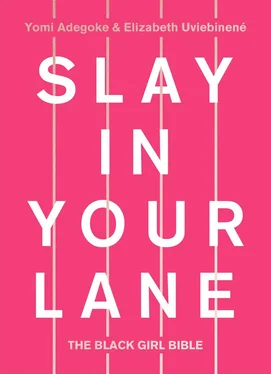‘They had very high aspirations, but as they got a bit older and they realised that they weren’t getting the support at school to get through, they would make very strategic choices, so they would say, “I’m not going to get my GCSE, but I will go to college and I will get it in another institution, and I will go for nursery nursing because I can get on that course, but I don’t necessarily want to be a nursery nurse. I want to go to university and study sociology, that might be a stepping stone for me.”
‘They knew the system didn’t work for them and so they made many choices to accommodate – I call it the “long, backdoor route into success” – so they have to make many, many more different steps to sidestep the racism and the lack of support in the system by making strategic choices. So it takes some much longer to get into higher education, into university. They’re usually older; nearly all my students when I was teaching at places like Southbank and Middlesex, all the black women were, you know, already in their mid-twenties, where the white young people would be 17, 18, 19. They were much younger because they didn’t have to navigate the system as much.’
If black parents do notice that their kids are struggling in school, they often look for alternative methods to compensate for the failure of mainstream schools, rather than trying to effect change in the schools themselves. Some black parents choose to send their children overseas during their secondary school years as soon as they start to see a pattern of bad grades or disruptive behaviour. When I was in Year 9 in secondary school, I was constantly warned that I would be sent to Nigeria if my grades didn’t pick up in maths and science, and my brother and sister were sent to boarding school there for a few years. This was in contrast with the faith they placed in the education system in the UK. I had friends who were in class on a Monday morning but by Friday they would have been taken out of school.
Private school is another option for parents who can afford it. Dr Nicola Rollock, Reader in Equity and Education at Goldsmiths College, University of London, started off in state education but her parents soon made the decision to send her to an independent school when they realised she wasn’t being stretched academically. ‘We used to read Peter and Jane books and they had a sequence – 1a, 1b, 1c – and I would get through the sequence quite quickly. Then, rather than being allowed to go on to the next sequence, 2 or 3 or 4, the teacher would ask me to go back to the beginning, so I was incredibly bored.’ Rather than move her into a higher class, Nicola was expected to wait for the rest of the class to catch up: ‘There was one black teacher who advised my parents to move me because I wasn’t flourishing there. I had been held back by my class teacher, a white woman, so my parents moved me and I went to an independent all-girls school.’
Some black parents supplement their kids’ education with tutoring. I went to a Saturday school for many years, run by two black women who employed highly motivated black teachers. There, parents had a say in the curriculum and the school was committed to raising the achievement levels of black students whose mainstream schools had often given up on them.
.....................................................
Attitude gal
.....................................................
So what do we know about why so many black girls are underachieving at school? We know that institutional racism plays a part and that bias in teachers’ perceptions and expectations contributes to some black pupils’ underperformance and attainment. Studies have revealed that bias can manifest itself in a number of ways. There is evidence that teachers have routinely underestimated the abilities of black students and that assumptions about behavioural problems are overshadowing their academic talents. In essence, low achievement among some black students is made worse because their teachers don’t actually expect them to succeed. Dr Steve Strand from Warwick University, the author of one study, said: ‘After accounting for all measured factors, the under-representation is specific to this one ethnic group and indicates that, all other things being equal, for every three white British pupils entered for the higher tiers, only two black Caribbean pupils are entered.’ 3
It’s no surprise then that, according to the same study, black children are also the most concerned about how teachers view them and are less likely to feel their teachers would describe them as clever. 4
Dr Maggie Aderin-Pocock MBE, space scientist and co-host of BBC2’s astronomy show, The Sky at Night , can relate to these findings: ‘At school I wasn’t considered to be very bright, I suffer from dyslexia and so when you first go to school it’s all about reading and writing. When I started the teachers said, “Oh yeah, okay, Maggie’s not very bright,” and they put me in the remedial class, and so I was in the back there with the safety scissors and the glue tucked out of the way and they didn’t see me as having much potential at all. This is quite in contrast with what I was getting at home, because I was speaking with my father and he was saying, “Ah yes, you should go to university, you should study,” and so the two were very much at odds. I didn’t speak much at school about what I wanted to do because usually when I did I think the teachers would try to be kind, but they would look at me with little disappointed faces, like, “Oh Maggie, science is for clever people, you should consider something like nursing, nursing is good, and that’s science, too.” So I think they were trying to mitigate my expectations. I felt a bit disillusioned; I felt that school wasn’t for me, so I would sit in remedial class. But things turned round at one specific moment for me, when I was sitting in a science class and a teacher asked a question. The question was “If one litre of water weighs 1kg, how much does one cubic centimetre of water weigh?” Now a cubic centimetre is one-1000th of a litre and I worked out, “Oh, that would be 1 gram.” So I put my hand up to answer the question and I looked around the class and no one else had their hand up. Now knowing that I was the dumb one in the remedial class I put my hand back down, because I thought I couldn’t be right. But then I decided to give it a go and I answered the question and got it right, and suddenly I thought, maybe I’m not as dumb as I thought. And science is a subject that gets people into space and so I thought “if I study science maybe I can go into space”. That was a real turnaround for me, so I started paying more attention in science classes, and as my science grades started going up, my other grades went up, too. After that I got lots of encouragement at school, because that’s when they saw I had an aptitude.’
Manifestations of unconscious bias in the classroom also extend to black girls being shown fewer leniencies than their white counterparts, and written off as problem children more quickly. The groundbreaking Swann Report in 1985 pointed out: ‘Teachers’ attitudes towards, and expectations of, West Indian pupils may be subconsciously influenced by stereotyped, negative or patronising views of their abilities and potential, which may prove a self-fulfilling prophecy, and can be seen as a form of unintentional racism.’ In the UK, black children are almost four times more likely to be suspended from school than white children. In the 2013–2014 school year, 18 per cent of black boys and 10 per cent of black girls were suspended from school. This is compared to 5 per cent of white boys and 2 per cent of white girls. 5In my school, I remember pupils being excluded because of their hair. Black kids were penalised for their hairstyles, whereas the white middle-class kids with floppy long hair were left alone. At the time I couldn’t understand why one kind of hair was policed and the other not. If someone’s hair doesn’t affect their ability to learn, why should it matter?
Читать дальше












